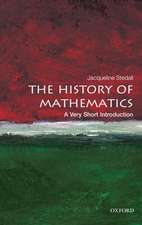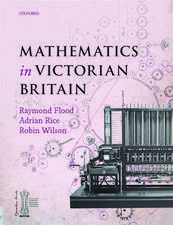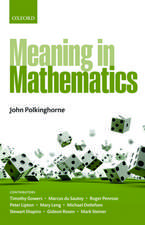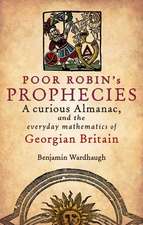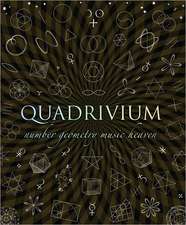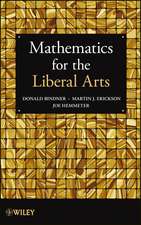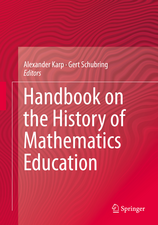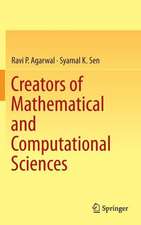Historiography of Mathematics in the 19th and 20th Centuries: Trends in the History of Science
Editat de Volker R. Remmert, Martina R. Schneider, Henrik Kragh Sørensenen Limba Engleză Hardback – 9 dec 2016
In the 19th century, the history of mathematics was recorded by a diverse range of people trained in various fields and driven by different motivations and aims. These backgrounds often shaped not only their writing on the history of mathematics, but, in some instances, were also influential in their subsequent reception.
During the period from roughly 1880-1940, mathematics modernized in important ways, with regard to its content, its conditions for cultivation, and its identity; and the writing of the history of mathematics played into the last part in particular.
Parallel to the modernization of mathematics, the history of mathematics gradually evolved into a field of research with its own journals, societies and academic positions. Reflecting both
a new professional identity and changes in its primary audience, various shifts of perspective in the way the history of mathematics was and is written can still be observed to this day. Initially concentrating on major internal, universal developments in certain sub-disciplines of mathematics, the field gradually gravitated towards a focus on contexts of knowledge production involving individuals, local practices, problems, communities, and networks. The goal of this book is to link these disciplinary and methodological changes in the history of mathematics to the broader cultural contexts of its practitioners, namely the historians of mathematics during the period in question.
| Toate formatele și edițiile | Preț | Express |
|---|---|---|
| Paperback (1) | 833.66 lei 38-44 zile | |
| Springer International Publishing – 28 iun 2018 | 833.66 lei 38-44 zile | |
| Hardback (1) | 1004.67 lei 6-8 săpt. | |
| Springer International Publishing – 9 dec 2016 | 1004.67 lei 6-8 săpt. |
Din seria Trends in the History of Science
- 18%
 Preț: 1118.62 lei
Preț: 1118.62 lei - 15%
 Preț: 647.08 lei
Preț: 647.08 lei - 15%
 Preț: 653.98 lei
Preț: 653.98 lei - 18%
 Preț: 952.26 lei
Preț: 952.26 lei - 18%
 Preț: 1553.64 lei
Preț: 1553.64 lei - 18%
 Preț: 958.88 lei
Preț: 958.88 lei - 15%
 Preț: 638.76 lei
Preț: 638.76 lei - 24%
 Preț: 2082.73 lei
Preț: 2082.73 lei - 18%
 Preț: 951.91 lei
Preț: 951.91 lei - 24%
 Preț: 685.92 lei
Preț: 685.92 lei - 18%
 Preț: 786.04 lei
Preț: 786.04 lei - 18%
 Preț: 785.11 lei
Preț: 785.11 lei - 18%
 Preț: 1004.48 lei
Preț: 1004.48 lei -
 Preț: 366.43 lei
Preț: 366.43 lei - 18%
 Preț: 1001.95 lei
Preț: 1001.95 lei - 18%
 Preț: 1129.33 lei
Preț: 1129.33 lei - 18%
 Preț: 950.96 lei
Preț: 950.96 lei
Preț: 1004.67 lei
Preț vechi: 1225.20 lei
-18% Nou
Puncte Express: 1507
Preț estimativ în valută:
192.27€ • 208.77$ • 161.50£
192.27€ • 208.77$ • 161.50£
Carte tipărită la comandă
Livrare economică 23 aprilie-07 mai
Preluare comenzi: 021 569.72.76
Specificații
ISBN-13: 9783319396477
ISBN-10: 3319396471
Pagini: 293
Ilustrații: X, 276 p. 8 illus., 1 illus. in color.
Dimensiuni: 155 x 235 x 18 mm
Greutate: 0.58 kg
Ediția:1st ed. 2016
Editura: Springer International Publishing
Colecția Birkhäuser
Seria Trends in the History of Science
Locul publicării:Cham, Switzerland
ISBN-10: 3319396471
Pagini: 293
Ilustrații: X, 276 p. 8 illus., 1 illus. in color.
Dimensiuni: 155 x 235 x 18 mm
Greutate: 0.58 kg
Ediția:1st ed. 2016
Editura: Springer International Publishing
Colecția Birkhäuser
Seria Trends in the History of Science
Locul publicării:Cham, Switzerland
Cuprins
Introductory remarks.- The History of Mathematics in the Progress of Mankind. Modifying the Narrative around 1800.- Practicing History of Mathematics in Islamicate Societies in the 19th-century Germany and France.- Mesopotamian Mathematics, seen "from the inside" (by Assyriologists) and "from the outside" (by Historians of Mathematics).- Appropriating Role Models for the Mathematical Profession: Biographies in the American Mathematical Monthly around 1900.- Greek Mathematics in English: The Work of Sir Thomas L. Heath (1861{1940).- Otto Neugebauer's Vision for Rewriting the History of Ancient Mathematics.- The `Mathematization of Nature': The Making of a Concept, and How It Has Fared In Later Years.- Histories of Modern Mathematics in English in the 1940s, 50s, and 60s.- Polycephalic Euclid? Collective Practices in Bourbaki's History of Mathematics.- Pulling Harriot out of Newton's shadow: How the Norwegian Outsider Johannes Lohne Came to Contribute to Mainstream History of Mathematics.- Contextualizing Unguru's 1975 Attack on the Historiography of Ancient Greek Mathematics.- Table of graphics.- Name index.
Recenzii
“This book appears in a series called 'Trends in the History of Science' that is devoted to papers produced in workshops and conferences … . Every practitioner should read this book, as should all thosewho teach history of mathematics, whether out of avocational interest or because their department compels them to.” (Tom Archibald, ISIS, Vol. 109 (2), June, 2018)
Textul de pe ultima copertă
This book addresses the historiography of mathematics as it was practiced during the 19th and 20th centuries by paying special attention to the cultural contexts in which the history of mathematics was written.
In the 19th century, the history of mathematics was recorded by a diverse range of people trained in various fields and driven by different motivations and aims. These backgrounds often shaped not only their writing on the history of mathematics, but, in some instances, were also influential in their subsequent reception.
During the period from roughly 1880-1940, mathematics modernized in important ways, with regard to its content, its conditions for cultivation, and its identity; and the writing of the history of mathematics played into the last part in particular.
Parallel to the modernization of mathematics, the history of mathematics gradually evolved into a field of research with its own journals, societies and academic positions. Reflecting both
a new professional identity and changes in its primary audience, various shifts of perspective in the way the history of mathematics was and is written can still be observed to this day. Initially concentrating on major internal, universal developments in certain sub-disciplines of mathematics, the field gradually gravitated towards a focus on contexts of knowledge production involving individuals, local practices, problems, communities, and networks. The goal of this book is to link these disciplinary and methodological changes in the history of mathematics to the broader cultural contexts of its practitioners, namely the historians of mathematics during the period in question.
In the 19th century, the history of mathematics was recorded by a diverse range of people trained in various fields and driven by different motivations and aims. These backgrounds often shaped not only their writing on the history of mathematics, but, in some instances, were also influential in their subsequent reception.
During the period from roughly 1880-1940, mathematics modernized in important ways, with regard to its content, its conditions for cultivation, and its identity; and the writing of the history of mathematics played into the last part in particular.
Parallel to the modernization of mathematics, the history of mathematics gradually evolved into a field of research with its own journals, societies and academic positions. Reflecting both
a new professional identity and changes in its primary audience, various shifts of perspective in the way the history of mathematics was and is written can still be observed to this day. Initially concentrating on major internal, universal developments in certain sub-disciplines of mathematics, the field gradually gravitated towards a focus on contexts of knowledge production involving individuals, local practices, problems, communities, and networks. The goal of this book is to link these disciplinary and methodological changes in the history of mathematics to the broader cultural contexts of its practitioners, namely the historians of mathematics during the period in question.
Caracteristici
Deepens readers’ understanding of key developments in the historiography of mathematics over the past two centuries Includes supplementary material: sn.pub/extras


